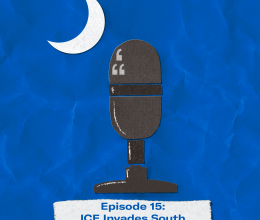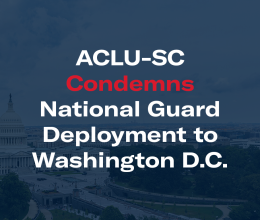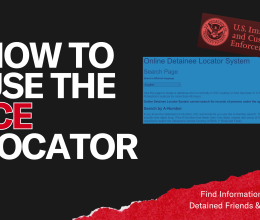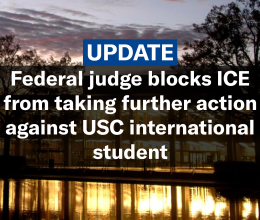
Today Gov. Henry McMaster and Sen. Lindsey Graham promoted a program that provides federal financial incentives to local law enforcement agencies that sign collaboration agreements with U.S. Immigration and Customs Enforcement (ICE) via the 287(g) program.
The American Civil Liberties Union of South Carolina opposes any expansion of 287(g) in South Carolina. These agreements are a disaster for civil liberties, a fiscal burden on local governments, and a threat to public trust in law enforcement.
“Americans have been watching in horror this year as ICE agents increasingly seek to act as masked secret police for a violent, unaccountable, and openly racist mass deportation regime,” said Jace Woodrum, Executive Director of the ACLU of South Carolina. “It is unconscionable for local law enforcement leaders not only to endorse ICE's daily abuses, but to join in those abuses as well.”
For a primer on 287(g) agreements in South Carolina and a map of counties currently collaborating with ICE, visit aclusc.org/287g. For context on 287(g) agreements and how they work, consider the following facts:
ICE collaboration erodes trust in law enforcement. A 2021 article in Political Behavior looked at places where local law enforcement cooperated with ICE and found that members of Hispanic communities who were victims of crimes became less willing to report those crimes.
Collaborating with ICE comes at a cost to local taxpayers. In Charleston County, a previous 287(g) agreement cost an estimated $4 million per year according to the South Carolina Appleseed Legal Justice Center. A 2019 study by the North Carolina Justice Center found that the cumulative cost to North Carolina taxpayers of collaboration with ICE over a decade was at least $81.7 million. It is not at all clear that the incentives being offered for ICE collaboration will make up for those costs, which can include more than just the salaries of officers.
Task Force Model agreements effectively turn local law enforcement officers into ICE agents. The Task Force Model is the most expansive form of ICE collaboration available under 287(g). The abuses exemplified by Maricopa County Sheriff Joe Arpaio's rampant racial profiling led ICE itself to halt all Task Force Model agreements starting in 2012. The Trump administration brought back Task Force Model agreements this year, and some law enforcement agencies in South Carolina have already signed these agreements as the total number of 287(g) agreements increased tenfold in 2025.
Aggressive ICE enforcement does not make our communities safer. ICE sees 287(g) agreements as a “force multiplier” while it seeks to fill arbitrary deportation quotas set by White House senior adviser Stephen Miller. Despite the administration’s claims that it is going after “cartels” and violent offenders, the data released by ICE show that as immigration enforcement increases, the percent of those arrested who are convicted of a crime decreases, according to the Immigration Research Initiative.
Racist enforcement patterns and a pattern of racial profiling threaten our civil liberties while exposing local law enforcement agencies to new legal liabilities. During the Biden administration, the ACLU conducted a review of the state and local law enforcement agencies participating in the 287(g) program at the time. Among the key findings of the 2022 report, at least 65% of 287(g)-participating agencies had records of a pattern of racial profiling and other civil rights violations, including excessive use of force.







